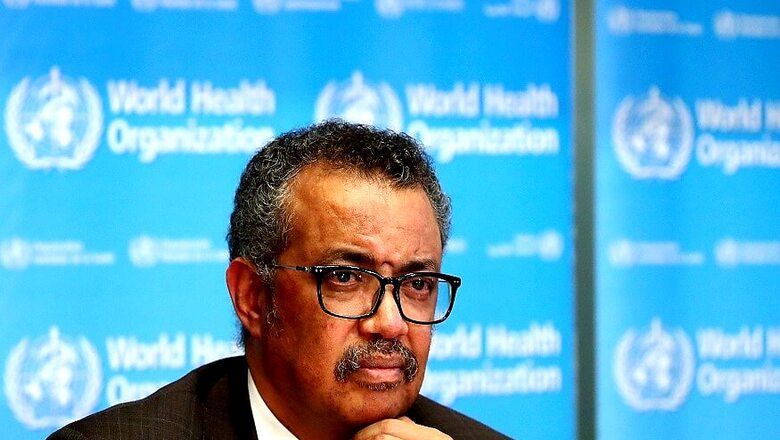
views
Geneva (Switzerland): Tedros Adhanom Ghebreyesus, the first African to head the World Health Organization, has drawn the ire of US President Donald Trump over his chummy tone with China in the face of the COVID-19 pandemic.
The former Ethiopian minister of health and foreign affairs has for months found himself at the heart of global efforts to rein in the novel coronavirus, which has now killed more than 130,000 people and infected some two million.
But in the past week, he has found himself in the eye of a different storm. Trump ramped up criticism of him and the WHO, accusing them of being too close to China and have mismanaged the response to the pandemic.
On Tuesday, the US president announced that Washington, the biggest contributor to the UN health agency, would suspend its funding.
The pandemic, combined with the threat of lost US funding, clearly constitutes the biggest challenge to date in the WHO director-general's near three-year tenure.
But Tedros, 55, a malaria specialist with degrees from Britain in public health and immunology, and the first person ever elected to the helm of the WHO, should have the legitimacy and strong support to weather the storm.
Before the 2017 vote, where he faced off against five other candidates, the UN agency's executive committee would put forward just one nominee for countries to approve or reject.
Tedros is renowned for his warmth and tendency to call everyone from colleagues to world leaders "brother" or "sister", setting him apart from the famously cool persona of his predecessor, Margaret Chan of China.
- 'Politicising' the pandemic -
But while he always seems to have a smile lurking under his trimmed moustache, Tedros has also revealed a fiery side.
After a hefty barrage of criticism from Trump last week, Tedros warned that "if you don't want many more body-bags then you refrain from politicising" the pandemic.
During that virtual briefing on April 8, Tedros also revealed that for months he had faced a virulent campaign of abuse against him, including racist comments and death threats.
"I don't give a damn... I am proud of being black or proud of being negro. Please quarantine COVID politics.," he said.
Tedros said much of the abuse he was suffering had originated in Taiwan. It is excluded from the WHO and other international bodies at the behest of China, which considers the self-ruling democracy to be a Chinese province awaiting reunification.
Taiwan, which even lost its observer status at the WHO in 2016, has, like Trump, harshly criticised the UN agency and its chief for being too willing to believe Beijing and praise it for its handling of the outbreak that began in China late last year.
On social media meanwhile, a battle is raging between the pro-Tedros and anti-Tedros camps. The WHO chief himself has joined the virtual fight, retweeting messages of support from a range of African leaders, other political actors and scientists.
- 'Firm, courageous' -
"I’ve known Dr Tedros for 27 years... He is a man of great principle, and his calm but firm, courageous leadership of WHO during this terrible COVID-19 pandemic is exactly what the world needs right now," tweeted Laura Hammond, a University of London professor.
Suerie Moon, the co-director of the Graduate Institute's Global Health Centre, meanwhile insisted on Twitter that "Tedros has proven himself to be a strong, skilled leader and experienced diplomat."
He certainly has a knack for diplomacy.
During the 2017 election, Tedros managed to fight off a last-minute controversy after an advisor to his British rival David Nabarro accused him of covering up three major outbreaks of cholera in Ethiopia.
He managed instead to highlight his drive as health minister to expand basic healthcare by building thousands of clinics and boosting community-based health services, and vowed to give the WHO a similar overhaul, with an emphasis on global health coverage.
When he took over, the organisation was undergoing far-reaching reforms after it mismanaged the initial response to the Ebola outbreak in west Africa, which killed more than 11,300 people between 2013 and 2016.
But just a few months into his tenure, he created a scandal by appointing Zimbabwe's then-president Robert Mugabe as a WHO goodwill ambassador. He was forced to backtrack.
That gaffe however has largely been forgotten, as the WHO has, under Tedros, scaled up its emergency response capabilities, and astutely responded to two new Ebola outbreaks, in the Democratic Republic of the Congo.

















Comments
0 comment